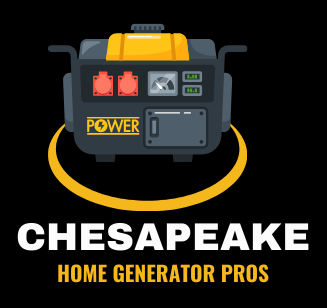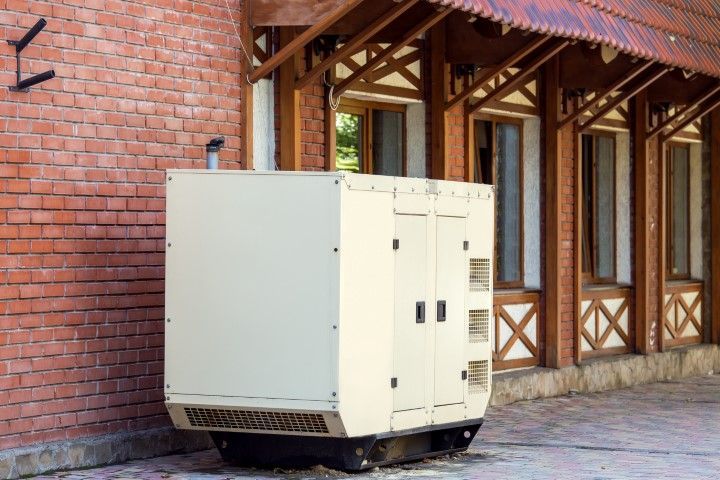
Commercial Generators in Chesapeake VA
A commercial generator is a robust, high-capacity device designed to provide backup power to businesses and larger facilities during power outages or failures. Unlike residential generators, which are typically smaller and designed for home use, commercial generators are built to handle the substantial power needs of commercial establishments. They ensure that critical operations remain uninterrupted, supporting everything from office buildings to manufacturing plants.
Types of Commercial Generators
Commercial generators come in several types, each suited to different needs:
- Diesel Generators: These are popular for their reliability and efficiency. They use diesel fuel, which is readily available and offers a long runtime, making them ideal for extended power outages.
- Natural Gas Generators: These generators are favored for their lower emissions and ease of fuel supply. They are a good choice for businesses that have a consistent natural gas supply.
- Propane Generators: Propane generators offer flexibility and are often used as a backup when natural gas is unavailable. They are generally less common but useful in specific scenarios.
- Hybrid Generators: Combining different fuel types, hybrid generators offer versatility. They can switch between fuels, depending on availability and cost, optimizing performance and efficiency.
Installation Process
Installing a commercial generator involves several critical steps:
- Site Assessment: A thorough evaluation of the installation site ensures the generator will be placed in an optimal location for both function and safety. This assessment includes evaluating space, ventilation, and accessibility.
- Permits and Regulations: Obtaining the necessary permits and ensuring compliance with local regulations is crucial. This process often involves coordination with local authorities to meet building codes and safety standards.
- Generator Placement: The generator must be placed on a stable surface, often on a concrete pad or similar foundation. Proper placement ensures the unit is level and secure.
- Electrical Connections: Connecting the generator to the building’s electrical system requires professional expertise. This involves installing transfer switches, wiring, and ensuring proper integration with the existing power system.
- Testing and Commissioning: Once installed, the generator is thoroughly tested to ensure it operates correctly and reliably. This includes running diagnostic checks and verifying that all components function as intended.
Regular Checks and Servicing
Regular maintenance is essential for keeping commercial generators in optimal working condition:
- Routine Inspections: Regular visual inspections help identify any obvious issues such as leaks or corrosion. Checking fluid levels and ensuring connections are tight are part of these inspections.
- Scheduled Maintenance: Follow the manufacturer’s maintenance schedule for changing filters, checking battery health, and inspecting the fuel system. Regular servicing helps prevent unexpected breakdowns.
- Load Testing: Periodic load tests ensure the generator can handle the power demands it is expected to meet. This test simulates a power outage to verify the generator's performance under load.
- Professional Servicing: Having a certified technician perform comprehensive servicing ensures that all aspects of the generator are thoroughly checked and maintained.

We will get back to you as soon as possible.
Please try again later.
Common Issues and Troubleshooting
Commercial generators can encounter issues that need addressing:
- Failure to Start: This could be due to fuel supply problems, battery issues, or electrical faults. Check the fuel level, battery condition, and connections.
- Overheating: Generators can overheat if the cooling system is malfunctioning or if there is inadequate ventilation. Ensure the cooling system is working correctly and the generator is in a well-ventilated area.
- Low Power Output: If the generator is not providing enough power, it might be due to a faulty component or an issue with the fuel supply. Inspect the generator for any signs of damage or wear.
- Unusual Noises: Strange noises can indicate mechanical issues or loose parts. Investigate the source of the noise and have it checked by a professional if needed.
Cost Considerations
The cost of a commercial generator can vary based on several factors:
- Generator Size and Type: Larger and more advanced generators generally cost more. Diesel generators tend to be pricier than natural gas or propane models.
- Installation Costs: Installation expenses include site preparation, electrical work, and compliance with regulations. Complex installations or challenging site conditions can increase costs.
- Maintenance and Operation: Consider ongoing maintenance and operating costs. Regular servicing, fuel expenses, and any potential repairs should be factored into the overall cost.
- Warranty and Support: Investing in a generator with a good warranty and reliable support can save money in the long run by covering repairs and providing peace of mind.
Emergency Preparedness
Having a commercial generator is a key element of business continuity planning:
- Power Outage Planning: Ensure that the generator is part of a broader emergency preparedness plan. This includes knowing how to operate the generator and what steps to take in case of an outage.
- Training: Train staff on the generator's operation and emergency procedures. Regular drills can help ensure everyone knows their role during a power outage.
- Fuel Management: Maintain an adequate fuel supply and have a plan for refueling during extended outages. Regularly check fuel levels and establish relationships with fuel suppliers.
- Backup Plans: Have contingency plans in place in case the generator fails or is unavailable. This could include additional backup generators or alternative power sources.
For businesses, ensuring you have a reliable commercial generator is essential. If you need assistance with choosing, installing, or maintaining a
commercial generator in Chesapeake, VA, don't hesitate to reach out. Our team of experts is here to provide guidance and support, ensuring your business stays powered and prepared for any situation. Contact us today to learn more and get started!
Key Components of Commercial Generators
Commercial generators play a crucial role in ensuring business continuity during power outages. Unlike residential units, these generators are designed to handle larger loads and provide power to entire facilities. Understanding the key components of commercial generators can help you make informed decisions about their maintenance, operation, and overall management. In this guide, we’ll explore the essential parts of commercial generators and their functions.
Engine
The engine is the heart of the generator. It converts fuel into mechanical energy, which then powers the generator. Commercial generators typically use diesel or natural gas engines. Diesel engines are known for their durability and efficiency, especially in large-scale operations. Natural gas engines offer cleaner operation and are often used where fuel availability and environmental considerations are important.
Alternator
The alternator transforms the mechanical energy produced by the engine into electrical energy. It consists of a rotor and a stator. The rotor spins within the stator to generate electricity. The quality and capacity of the alternator are crucial for the generator's performance and the quality of the power supplied.
Fuel System
The fuel system includes the tank, fuel pump, and fuel filters. It stores and supplies fuel to the engine. The size of the fuel tank and the efficiency of the fuel system are important for the generator’s runtime and performance. Regular maintenance of the fuel system ensures that the generator operates smoothly and reduces the risk of fuel-related issues.
Cooling System
Generators generate a lot of heat during operation, so a cooling system is essential to prevent overheating. The cooling system typically includes a radiator, fan, and coolant. It helps maintain the engine at the optimal operating temperature, ensuring reliable performance and extending the life of the generator.
Control Panel
The control panel is the interface between the generator and the operator. It includes gauges, meters, and switches that allow you to monitor and control the generator’s operation. Modern control panels often come with advanced features such as remote monitoring and automatic start/stop capabilities.
Exhaust System
The exhaust system directs and reduces the noise of exhaust gases produced by the engine. It typically includes the exhaust manifold, muffler, and exhaust pipe. Proper maintenance of the exhaust system is important for safety and compliance with noise regulations.
Battery
The battery provides the necessary power to start the generator. It also helps in maintaining the electrical system when the generator is not running. Regular battery checks and maintenance ensure that the generator starts reliably when needed.
Enclosure
The enclosure houses and protects the generator’s components from environmental factors. It is designed to withstand weather conditions and reduce noise. Enclosures can vary in size and material, depending on the generator’s location and application.
Automatic Transfer Switch (ATS)
The ATS automatically switches the power source from the utility to the generator when a power outage occurs. It ensures a seamless transition and minimizes downtime. The ATS is critical for maintaining business operations without interruption.
Understanding the key components of commercial generators is essential for effective maintenance and operation. If you have any questions or need assistance with your commercial generator, don't hesitate to reach out. Our team of experts is here to help you with installation, maintenance, and any other needs you may have. Contact us today to ensure your generator is always ready to perform when you need it most.
The Role of Commercial Generators in Business Continuity
In today’s fast-paced business environment, ensuring uninterrupted power supply is crucial for maintaining smooth operations. Commercial generators play a pivotal role in this by providing a reliable backup power source in case of electrical outages. Businesses, ranging from small enterprises to large corporations, rely on these generators to safeguard their operations, protect their assets, and enhance their overall efficiency.

Minimizing Downtime
Power outages can disrupt business activities, leading to loss of productivity and revenue. Commercial generators serve as a vital backup, ensuring that operations continue seamlessly even during power failures. By reducing downtime, businesses can maintain their workflow and avoid potential financial losses associated with outages.
Protecting Sensitive Equipment
Many businesses use sensitive equipment and technology that require a stable power supply. Power fluctuations or outages can cause damage to this equipment, resulting in costly repairs or replacements. A commercial generator helps protect these valuable assets by providing a steady and reliable power source, thereby preserving the integrity of essential machinery and technology.
Maintaining Customer Service
For businesses that rely on customer service, any interruption can negatively impact their reputation and customer satisfaction. Commercial generators ensure that businesses remain operational during power outages, allowing them to continue serving their customers without interruption. This reliability fosters trust and ensures that customers have a consistent experience.
Enhancing Safety and Security
Power outages can compromise safety and security systems, such as lighting, alarms, and surveillance cameras. Commercial generators keep these systems operational, safeguarding the premises and ensuring the safety of employees and assets. By maintaining a secure environment, businesses can prevent potential risks and maintain a safe workspace.
Supporting Critical Operations
Certain businesses, such as healthcare facilities, data centers, and financial institutions, rely on continuous power to perform critical operations. In these sectors, any loss of power can have serious consequences. Commercial generators provide an essential backup power source, enabling these critical functions to proceed without interruption and ensuring that essential services remain available.
Boosting Business Continuity
Business continuity is vital for long-term success. Commercial generators play a key role in ensuring that businesses can continue their operations during power disruptions. By having a reliable power backup in place, companies can enhance their resilience and adapt to unexpected challenges, thus supporting their overall business continuity strategy.
To learn more about how commercial generators can benefit your business, contact us today. Our team of experts is ready to assist you in selecting the right generator for your needs and providing ongoing support to ensure your operations remain uninterrupted. Don’t let power outages disrupt your business—reach out to us and secure a reliable backup power solution today.
Let's Connect!
As power outages become increasingly common, having a reliable backup generator can make all the difference. We specialize in providing top-notch generator installation and maintenance services to keep our customers prepared for anything. Whether you're looking for a whole-house generator or a small portable unit, we have the knowledge and expertise to help you choose the right option for your home and budget. Don't let life's unexpected power outages catch you off guard—hire us today and enjoy peace of mind knowing that your home is protected.